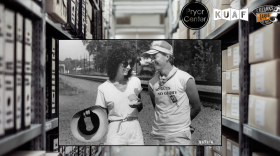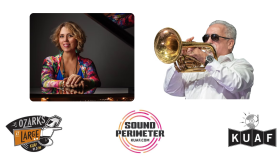Tomorrow night, the Faulkner Performing Arts Center on the University of Arkansas campus will host a free screening and panel discussion for the latest Ken Burns documentary. The event is a partnership with Arkansas PBS and the University of Arkansas Humanities Center, and they’ll be offering a sneak peek of The American Revolution.
Casey Sanders is the outreach producer for Arkansas PBS. Trish Starks, a distinguished professor of history and the director of the school’s Humanities Center. They both joined Ozarks at Large’s Matthew Moore last week to discuss the event.
Sanders says when a project like a new Ken Burns documentary comes around, the team at Arkansas PBS begins to think about how to find a way to offer companion programming to localize it.
Casey Sanders: How do we start to get a discussion going? That kind of looks to answer some of those questions that we think people might come to if they’re sitting in their living room watching this documentary. What was going on in Arkansas?
And we want to look around the state and find locations so that we’ve got geographic diversity for our events. And we’d had a really wonderful event around the Ken Burns program The U.S. and the Holocaust, and we partnered with the U of A and the Fayetteville Public Library for that one. And so for this one, I started reaching out to various professors and programs, particularly the Fulbright College, to kind of see what we could put together. And I eventually found Trish, and we started working together to think about what this panel could be, think about what we could bring to the conversation.
We weren’t a state during the American Revolution, so, you know, what were we? You know, what was going on in our region? And then we do have a skirmish at Arkansas Post. And Trish was able to connect us to people that have a lot of connectivity to the state of Arkansas and the history, and we’re going to be rolling people right through it. It’s a phenomenal panel that we’ve got for the discussion.
Matthew Moore: Trish, for you, as you think about it, you get this request, hey, let’s make this happen. What’s the first thing that goes through your mind? Are you thinking like, who do I get on here? Who really knows what they’re talking about?
Trish Starks: The first thing I thought was what a wonderful opportunity for the University of Arkansas and Fulbright College to have this kind of connectivity with such an amazing cultural milestone as one of the Ken Burns documentaries.
And then, yes, I feel like what I do as the director of the Humanities Center is to try and bring the top-quality researchers and scholars of the University of Arkansas out into the public. And those are humanities scholars that are connected to history and English and world languages and philosophy — the people that really help us to understand where our world comes from. Who are we? How do we communicate those ideas?
And so this was an amazing opportunity to bring together that kind of scholarship and outreach alongside a phenomenal documentary from the PBS people.
Matthew Moore: You know, as we think about PBS and Ken Burns, it’s a bit synonymous with one another, right? When you think about localizing programming, which is a lot of what we do here at KUAF, too, is thinking about how do we take these great national and recognizable things and make them accessible to our community in a way that can be impactful? What does that look like for you guys on your end to think about? Like, like you said, Arkansas was not a state. It was not one of the 13 colonies. How do we think about localizing a story like this in a way that, like, is a home run kind of piece of content?
Casey Sanders: Some stories are easier than others. We’ve been doing this with Ken Burns since The Civil War. And when he released The Civil War, we turned around, and someone that the university is very familiar with, Dale Carpenter, who’s just a newly retired professor from the University of Arkansas — well, he was with us at the time — and he did Arkansas in the Civil War.
So we did a whole documentary playing off of Ken Burns’ national documentary on Arkansas. But then when you hit programs that Ken Burns has done, such as Leonardo da Vinci, there aren’t real connections to Arkansas. However, it can be quite easy when you really think about it to extrapolate that out. So we pulled in people who were in the arts and architecture for da Vinci because of all of his interests and really took that as a — and for all of them, they’re really kind of jumping-off points.
For this one, this conversation about The American Revolution is a jumping-off point for us to talk about Arkansas — Arkansas’s history. And for this one, it’s also the kickoff for the American Revolution’s 250th, which we are just entering. So honestly, we’ve got a very broad palette that we can use to localize this particular documentary.
Matthew Moore: Trish, for you, as we look at the panelists here, we have Dr. Linda Jones, who’s the chair of World Languages. We’ve got Dr. Patrick Williams, professor of history, the editor of the Arkansas Historical Quarterly, and of course, Elliott West, who is a distinguished professor emeritus and author talking about the American West and expansion there. These all feel like the exact right voices for this conversation.
Trish Starks: It is serendipitous, right? Even though we’re sitting here just talking about how does the American Revolution have something to do with Arkansas, which was not a state, here we have panelists that speak to that very thing, and they’re right here on site. Again, just a point of how great our scholars are here at the University of Arkansas.
Linda Jones has been working on French missionaries of the Mississippi region in that exact period — well, in earlier and in through to that exact period — for decades. Patrick Williams has been at the Arkansas Historical Quarterly for decades. And Elliott West is synonymous with the West. And so we just have such great people right here on site that are ready to talk about the issues that are important for people understanding how this documentary has resonance with Arkansas.
Matthew Moore: Before we went to air, Trish, you and I were talking about how you had a meeting with the panelists. What did that conversation look like? How do you prepare to have a panel conversation about such a topic like this?
Trish Starks: You know, it’s wonderful when you have people that know so much to just put them in a room and have them start talking, because each one of them was like, oh, this is what I want to do, this is how this works. And they also knew each other so well that they really started to percolate like jazz — as to how each one of them could bring out aspects of this for the audience that would be exciting and insightful.
And I think part of that is also that each one of them is a master teacher. Each one of them is ready to be empathetic and think about what does the audience need to know, want to know, and be excited to know? And so each one of them is bringing that kind of energy to the discussion. And I’m very excited for the aspects that they were discussing as part of that panel.
Matthew Moore: Casey, for you, as you think about your role in this outreach perspective for a PBS-based audience, this feels like an easy thing to want to go to. But perhaps for people who are students on campus or who might be tangentially related to the university and may not have quite as much familiarity with Ken Burns or PBS, what sort of work goes into making sure that this is a thing that they don’t want to miss?
Casey Sanders: We definitely pay a lot of attention to bringing multiple voices and ages into the conversation — and in this case, into the event and the panel discussion. Partnering with the university helps us to a certain length for that, to connect to the student body. But we do a lot of outreach just via partner organizations that we think will get us into some of the areas we’re always having to try to figure out how to get into — some of the areas that we don’t reach.
We joke about it, we talk about it all the time, but we’ve got parents and little kids, and then we lose them for a little bit, and then we get them back when the kids have become parents. So we’ve got that middle area.
One thing that we’re doing for this project is we’re partnering with National History Day, and the National History Day coordinator has been helping us get connected to the schools that participate in National History Day. And we will invite those students to be part of any of the events that we do to help us reach a younger audience.
It can be a little bit of a reach for a program like this because it’s a pretty heavy documentary, and those can be middle school students — it’s high school and middle school — but we look at ways to find organizations that are in touch with some of these audiences that maybe won’t see our promotions that are on our air. And then, of course, we’ve got social media that we rely on quite heavily to get the word out.
Trish Starks: And I just want to mention that some of our panelists are very well acquainted with that kind of moving between different audiences. Elliott West was on The Joe Rogan Experience. Yes, he was on The Joe Rogan Experience talking about Continental Reckoning, his book that was nominated for a Pulitzer and won the most prestigious American history award, the Bancroft Prize. So he is speaking to high and low and mid, and it’s just dynamic and interesting and accessible.
Trish Starks is the director of the University of Arkansas Humanities Center and a distinguished professor of history. Casey Sanders is the outreach producer for Arkansas PBS.
Tomorrow night’s free event at the Faulkner Performing Arts Center on the U of A campus begins at 5 p.m. with an opening reception, and the screening begins at 6 p.m.
Ozarks at Large transcripts are created on a rush deadline. Copy editors utilize AI tools to review work. KUAF does not publish content created by AI. Please reach out to kuafinfo@uark.edu to report an issue. The audio version is the authoritative record of KUAF programming.








